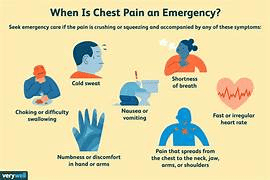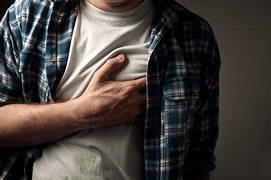You could feel uneasy just thinking about chest pain. We get afraid and wonder if something complicated is happening inside your body due to that nagging sense. Such fear won’t let you sit easily. Instead of crumbling under it and fearing, face it by learning about your medical conditions.
This might be difficult. However, do not worry; let us take you through some essentials in this blog that will make you recognize symptoms and causes of chest pain and the important considerations that guide your decision about whether to seek emergency medical assistance or not.
Start Reading!
Causes of Chest Pain
Musculoskeletal Causes:
Chest discomfort may result from problems with the muscles, bones, or joints, such as:
- Costochondritis: Concentrated chest discomfort brought on by inflammation of the cartilage linking the ribs to the breastbone is made worse by pressure or movement.
- Muscle Strain: Pain and discomfort, especially while engaging in physical activity, can result from overusing or injuring the chest muscles.
Gastrointestinal Causes:
Any of the following can bring on chest discomfort with gastrointestinal origins:
- Heartburn: It results from acid reflux, which is the overflow of stomach acid into the oesophagus.
- Gallstones: Chest pain that usually comes on after eating might be caused by gallstones obstructing the bile ducts.
- Oesophagal spasms: These uncontrollable spasms of the oesophagal muscles can cause constricted chest discomfort.
Cardiac Causes:
Chest pain can be a result of several heart-related diseases:
- Angina: The condition persists due to inadequate oxygen-rich blood in the heart muscle, leading to pressure on the chest.
- Heart attack: A blockage of coronary arteries stops the blood flow to the heart, which results in intense chest pain.
- Pericarditis: A severe chest ache, stabbing, and may intensify with deep breaths or coughing as a result of pericarditis, an inflammation of the sac that surrounds the heart.
Respiratory Causes:
Several respiratory conditions can cause chest pain, including:
- Pneumonia: Lung inflammation results in a piercing or sharp chest pain frequently accompanied by a cough, a fever, and breathing difficulties.
- Pulmonary Embolism: Blood clots can cause sudden, severe chest pain, breathing difficulties, and a rapid heartbeat, which are known as pulmonary emboli.
- Pleurisy: An inflammation of the inner layer covering the lungs causes a sharp, stabbing pain that worsens when you breathe a lot of air or cough.
Symptoms of Chest Pain
Chest Pain Associated Symptoms According to the underlying cause, the accompanying symptoms of chest pain can change. For a more thorough evaluation, it’s critical to recognize these symptoms.
Some typical signs include:
- Chest pain that is excruciating, squeezing, or crushing and may spread to other parts of the body.
- Arms, the jaw, the neck, the back, and the shoulders are all affected by the pain.
- Shortness of breath or breathing difficulty, frequently accompanied by tightness in the chest.
- Nausea, feeling lightheaded or dizzy, or passing out.
- Clammy skin or cold sweats.
- An irregular or fast heartbeat.
- Weakness or drowsiness.
- Pale skin indicates low oxygenation and the possibility of respiratory or cardiovascular problems.
- Raspy or hoarseness in voice.
- Swallowing difficulties with pain in the throat during swallowing.
When to Seek Medical Assistance?
There are situations when things can go out of control despite identifying symptoms. A doctor should assess any persistent chest pain. Visit a doctor at your earliest if the pain persists. Muscle spasms, minor infections, and other conditions may have contributed to chest pain that goes away.
There is a need for prompt medical assistance if certain symptoms are present, such as:
- Intense chest pain that lasts for a while.
- Shortness of breath, perspiration
- Arms, the neck, the jaw, or the back may experience radiating chest pain.
- A rapid or erratic heartbeat along with chest pain.
- High heart disease history.
Further Options
Imagine an unexpected turn of events, a surprise that takes you off guard. When a medical condition hits, your body experiences intense agony. However, do not worry; MYDOC Urgent Care walk-in clinic in Levittown will be there for you no matter what. Their 24/7 facilities are operated by skilled emergency physicians who received training at prestigious Levittown schools and are prepared to provide prompt examination, accurate diagnosis, and efficient treatment.
The Editorial Team at Healthcare Business Today is made up of skilled healthcare writers and experts, led by our managing editor, Daniel Casciato, who has over 25 years of experience in healthcare writing. Since 1998, we have produced compelling and informative content for numerous publications, establishing ourselves as a trusted resource for health and wellness information. We offer readers access to fresh health, medicine, science, and technology developments and the latest in patient news, emphasizing how these developments affect our lives.









